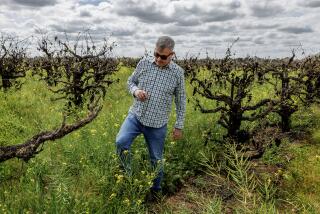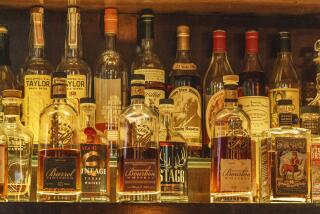Winegrowers Ponder Ways to Plug the Rising Cost of Portuguese Corks : Packaging: With the cost of the bottle stoppers increasing, the industry seeks alternatives, such as shorter corks or plastic.
AGEN, France — Wine drinkers could find a shortened cork or even a plastic stopper in the neck of their favorite bottle of Bordeaux if cork costs continue to climb, French wine growers say.
The price of the standard two-inch cork is rising by 10% to 15% a year because Portuguese suppliers, having driven French competitors from the market, are now in a monopoly position, some growers complain.
“The price of a cork stopper is becoming truly prohibitive,” said Joel Buisson, who produces a modest “vin de pays” in southwest France.
At close to two francs (35 cents) each, today’s corks now cost as much as a glass of the wine they help hold, Buisson said. In cheaper wines, selling for about 10 francs ($1.75) a bottle, the cork accounts for a fifth of the price.
“That’s just too much,” he said.
Wine growers such as Buisson, frustrated at having to pay what they regard as inflated prices for Portuguese cork, are now beginning to wonder. If champagne’s reputation is not hurt by a one-inch cork, they ask, why can’t they, too, “shorten” their costs.
If this means putting a little more wine in the bottle to close the gap, then that is probably cheaper in the long run than paying for the bigger cork, they reckon.
Fernand Barray of Barbaste, the former capital of French cork, claimed the industry he used to work in had been ruined by Portuguese dumping tactics.
“All this is the fault of Portugal, which wrecked prices five or six years ago and destroyed French makers,” he said in an interview. Portuguese cork producers also buy up bark from Spanish cork oaks.
Others say, however, that making a scapegoat of the Portuguese would not hide past errors by the French themselves, who planted pine instead of cork oaks in the 1950s after forest fires ravaged the main source of domestic supply.
In 1950 there were 48 cork producers in the southern Landes region. Today there are no more than five, according to Daniel Biraud of the Lot-et-Garonne Chamber of Commerce.
“The poor decision of the politicians of the period to encourage the planting of pine in burned-out areas ended up by reducing local production to less than 3% of real needs,” Biraud said.
Growers said there was nothing in the law to regulate the length of the stopper or to insist that it be made of cork.
“One of my friends won first prize for his rose wine, but nevertheless it’s corked with plastic,” said Buisson.
He added that nothing could stop producers of the top quality grand cru wines from doing likewise if cost pressures continued to rise--provided they were convinced that consumers would accept the move.
“Once you’ve explained to the consumer that plastic, unlike cork, does not give a taste to the wine and that it costs significantly less, I’m afraid that cork, which is really only a snobbery, will be abandoned.”


